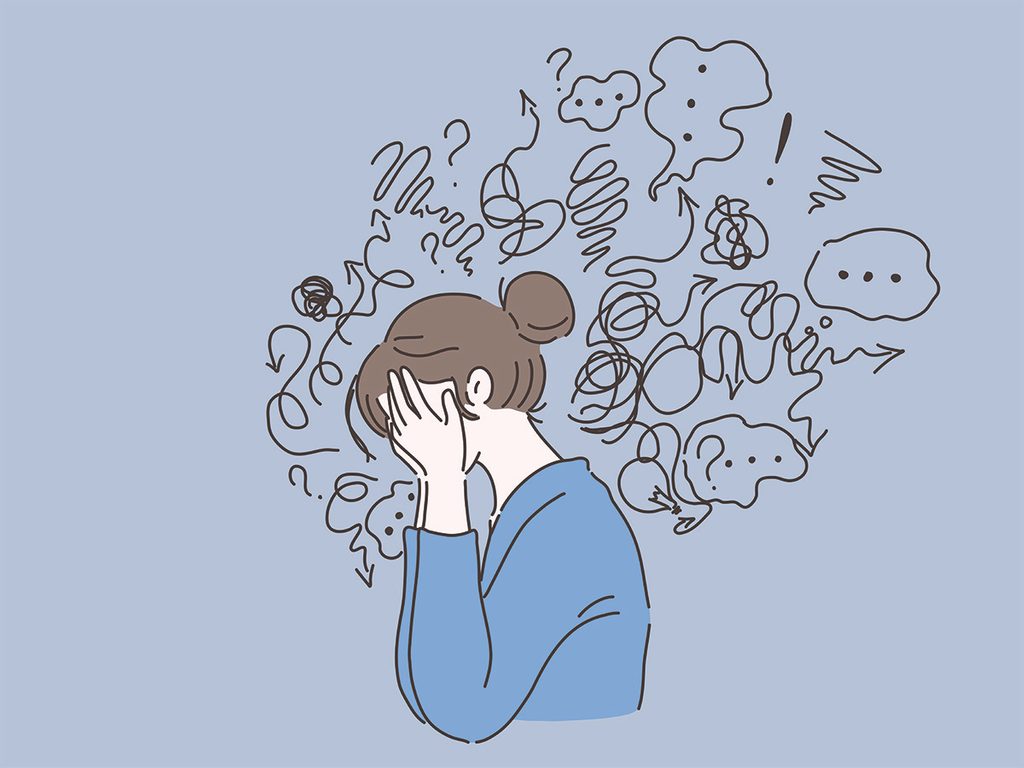How to Know If Your Anxiety Is “Normal”

Is a constant, low-grade fear of an impending health scare also cause for worry? We went to experts to find out.
I’m a consistent but casual worrier by nature. My health isn’t in my usual rotation of anxious thoughts, though. It’s more likely to be worries about money, parenting and my career that cycle through my brain at 3 a.m. In general, worries don’t dominate my thoughts on a day-to-day basis or rule my life (although the morning after a restless night can feel pretty soul-destroying). And when it comes to my actual well-being, I’m fortunate to be a healthy person — and fortunate that I see myself that way.
But since COVID-19, I’ve taken a few anxious double takes. Was my stuffy nose really just seasonal allergies? When my oldest daughter came down with a fever, I worried it was something more. And when my husband, who is a front-line worker, had a stomach bug and was required to go to the hospital for testing — well, I veered close to panic. These abstract fears have started to follow me around like a shadow.
So is the fact that I, a quiet 41-year-old without an anxiety problem, find myself with a constant, low-grade fear of an impending health scare also cause for worry? At this point, I don’t know too many people who aren’t feeling a twinge of anxiety on a daily basis. How are people with diagnosed anxiety disorders — especially those relating to health — expected to cope?
(Related: Kristen Bell Tells Us, ‘Anxiety Is Really at the Forefront of My Brain at All Times’)
What is health anxiety?
Since the start of COVID-19, you’ve likely heard friends talk and seen lots of online chatter — both serious Facebook posts and flippant Instagram memes — about escalating anxiety around health. But feeling a pandemic-induced health panic isn’t the same as having a diagnosed health anxiety disorder.
“Essentially, health anxiety is when a person has an irrational and obsessive worry about having a serious medical condition or illness,” says Dr. Kristen Kaploun, a clinical psychologist in Burlington, Ont. In the extreme, it’s what people used to refer to as hypochondria (now an outdated term).
“A hallmark feature of health anxiety is that it really goes above and beyond what would be considered a normal concern for your health,” says Kaploun. For a person with high health anxiety, a headache can be interpreted as evidence of a brain tumour, for example. And in the context of a coronavirus, a person with high health anxiety is likely to misinterpret basic bodily sensations and changes, like mild shortness of breath, a dry throat or muscle aches, as proof of infection.
For people with health anxiety, “Is this normal?” is a near-constant refrain, says Kaploun. While many of us may find ourselves asking this question more these days, people with true health anxiety are calling their doctors for referrals to specialists on a daily basis, sometimes again and again, and even showing up at the ER several times a week. “No amount of reassurance or proof of health is really enough,” she says. It may be clear to the health professionals working with them, as well as their family and friends, that their symptoms are imagined, but to a person with high health anxiety, the possibility of illness is real.
When should I worry about my health worries?
“We know from research conducted prior to the COVID-19 pandemic that almost everyone experiences health anxiety to some degree,” says Dr. Melanie Badali, a psychologist and board director of Anxiety Canada. Like most types of anxiety, health anxiety is evaluated on a continuum. In theory, low-level health anxiety is beneficial because it spurs us to pay attention to potential problems, seek diagnosis and treatment, and take proactive care to prevent illness and disease. “However, excessive health anxiety can be detrimental and cause a lot of suffering,” says Badali.
Figuring out if you’ve crossed that line can be tricky these days. It seems that so many of us are on health high alert, partly because the stakes are so high. Jenn Dunstan is a 34-year-old single mom with irritable bowel syndrome who’s been experiencing serious (and likely stress-induced) flare-ups since the start of COVID-19. “I’m solely responsible for my rent and bills,” she says. “I’m constantly afraid of becoming ill and unable to work or provide for my two kids.”
Then there are women like Lauren Mugford, 28, who’s not too anxious about actually contracting COVID-19 but is feeling the mental health effects of an isolated and unsettled pandemic life. “I’ve tried to be strong mentally and keep my nerves at bay, but over time I am noticing the long-term effects on my body,” she says. Mugford adds that she didn’t have her period for four months, “which has never happened before.”
The health worries and the ripple effect of that anxiety are serious issues. “Some experts predict there will be a mental illness pandemic that follows or coincides with the COVID-19 pandemic,” says Badali.
Many people with diagnosed health anxiety rely on cognitive behavioural therapy (CBT) to manage the disorder, in which they learn about thoughts and behaviours that influence anxiety and how to change them. While CBT and the help of a therapist are useful for many people, there are general anxiety management strategies that can help too. At the core, dealing with health anxiety is about learning more about anxiety in general and connecting to what you’re feeling, says Badali. “Knowledge is power,” she says. “Learning new things helps us build resilience.”
Now that you know you have normal anxiety, learn how to stop worrying and have a happier life.




